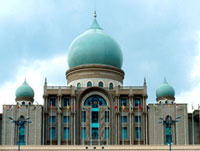 PUTRAJAYA, July 31 -- The Federal Court has reserved its judgement on the constitutionality of certain criminal law provisions in the Selangor and Terengganu Syariah enactments.
PUTRAJAYA, July 31 -- The Federal Court has reserved its judgement on the constitutionality of certain criminal law provisions in the Selangor and Terengganu Syariah enactments.
This follows the hearing before Chief Justice Tun Abdul Hamid Mohamed, Court of Appeal President Tan Sri Zaki Tun Azmi and Federal Court Judge Datuk Zulkefli Ahmad Makinudin today of submissions by all parties interested in the matter that arose from criminal proceedings instituted against a self-proclaimed prophet and three others.
The 57-year-old self-proclaimed prophet -- Abdul Kahar Ahmad -- and followers Mazli Mansor, 49, and Mat Razali Kasan, 44, sought a declaration that Sections 7, 8(a), 10 (b), 12 and 13 of the Selangor Syariah Criminal Enactment 1995 and Section 49 of the Administration of the Religion of Islam (State of Selangor) Enactment 2003 were invalid and contradictory to the Federal Constitution.
Meanwhile, Sulaiman Takrib, 59, a follower of the Ayah Pin deviationist sect, sought to challenge the constitutionality of Sections 10 and 14 of the Syariah Criminal Offences (Discretionary Penalty) (Terengganu) Enactment 2001 and Section 51 of the Administration of Islamic Religious Affairs (Terengganu) Enactment 2001.
Kahar, from Kampung Kemensah, Ampang, has been charged under the Selangor Syariah Criminal Enactment at the Shah Alam Syariah High Court with declaring himself a Malay prophet, spreading deviationist teachings, insulting and breaching Islam teachings and acting against the edict and mufti.
Sulaiman is facing charges in the Besut Syariah Lower Court of acting in a manner which insulted religious authorities for disobeying the fatwa that the teachings propagated by Ariffin Mohamad or Ayah Pin, 65, were false, deviationist and digressing and could threaten public order and destroy the faith of Muslims.
In his submission, lawyer Malik Imtiaz Sawar who appeared for the four men, argued that the respective state legislative assemblies were not empowered to create the criminal provisions because the offences were not one against the precepts of Islam.
The power of the State Fatwa Committee was limited to creating law on offences against the precepts of Islam while the offences faced by his clients were offences under criminal law and therefore must be subjected to the legislature procedure under the Federal Constitution, he said.
He said the disputable provisions also created the fatwa committee as being an independent legislative body to enact substantive law and abdicating the essential legislative powers and functions in determining the propriety of certain actions concerning the religion of Islam to the fatwa committee through excessive delegation of legislative power.
Selangor Legal Advisor Datin Paduka Zauyah Be Loth Khan submitted that the applicants had improperly narrowed the meaning and scope of precepts of Islam in the Federal Constitution by interpreting the meaning of precepts as "rukun-rukun Islam" (fundamentals of Islam).
"By doing so, the petitioners have tried to limit the power of the Selangor State Legislative Assembly to enact laws on offences against the precepts of Islam," she said and added that the precepts of Islam had a wider meaning and not confined to the five pillars of Islam.
She also submitted that there was no delegation of essential legislative functions to the fatwa committee and mufti, instead the committee and mufti were only duty bound to prepare a fatwa on any controversial question relating to Islamic law.
"The power to enact laws to make an offence of any actions contrary to the fatwa is in the hand of the Selangor State Legislative Assembly," she said.
She said the offences for which the four men were being tried were offences under the precepts of Islam and within the state legislative assemblies' power to enact and not Parliament as it was not under criminal law.
Terengganu Legal Advisor Noorbahri Baharuddin argued that the state fatwa committee could enact laws because a state legislative assembly might be incompetent to do so relating to a Muslim especially when the state legislative assembly was dominated by non-muslim assemblymen.
"It is only the Sultan's assent to the fatwa and its subsequent gazette which makes the fatwa a binding fatwa on all Muslims in Terengganu," she said said.
She said both sections disputed by Sulaiman relating to "aqidah" and "hukum syarak" were validly enacted according to the Federal Constitution.
Senior Federal Counsel Datuk Kamaludin Md Said who represented Government of Malaysia, said the fatwa committee and religious council were not independent legislative bodies and their function was merely to investigate religious issues raised before submitting their findings and recommendations to the Sultan.
-TMB

No comments:
Post a Comment